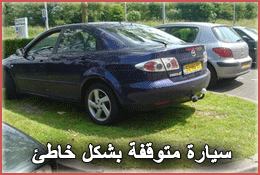-
In this lesson the loudspeaker announcement ends politely with the words "wa shukran". This is a typically Arabic formula used by TV moderators and other people who make public announcements.
The Arabic conjunction "wa" is far more frequent than its European equivalents ("and", "et", "und", etc.) and often has to be omitted when Arabic texts are translated into a European language. However, it would be an error to assume that the frequency of coordinative conjunctions is identical in all European languages. The conjunction "et", for instance, is much less frequent in French texts than "and" is in English texts. Official announcements made in French often end very abruptly. A good example is provided by the speech delivered by Jacques Chirac when he announced his resignation on 25 August, 1976. At the end of his speech he paused for a moment and then added dryly: "Je vous remercie". -
Great insights Desmond - I am fascinated by your commentary. wa shukran!
-
Apparently "Je vous remercie" means thank you. That doesn't seem like an abrupt way to end a speech to me.
Anyway, it's interesting that something like the nisba suffix is used in English too. Of course there's gold / golden but silver / silvery and informally adding the "ee" ending to turn a noun into an adjective happens in English a lot. This makes me think that our world languages have had a continuous affect on one another. -
Yes, "Je vous remercie" does mean "Thank you", but the fact that Chirac thanks his listeners does not render his conventional concluding formula less "abrupt". Abruptness is a relative concept. Although the polite formula employed by Chirac will not necessarily be perceived as abrupt when it is considered alone in its French context, it does seem rather abrupt when it is compared with the corresponding Arabic formula.
What I wanted to stress is the fact that native speakers of Arabic often use conjunctions in cases where native speakers of French do not. In the present instance the insertion of the conjunction "et" before "je" would sound incongruous, especially because of the pause that precedes "Je vous remercie".
This brings me to my next point. It is particularly instructive to compare the use of "wa" in "Car parked wrongly" with the use of the same conjunction in the lesson entitled "Covering letter". In the latter case the formula "wa ba'd" is used to connect the salutation with the main body of the letter. There is nothing like "wa ba'd" in English, French, German or any other European language with which I am familiar. In Latin, for instance, letters begin with a succinct formula such as "Cicero Appio imp. s.d."; in French you use salutations like "Monsieur le Directeur" or "Monsieur", etc.
"Wa shukran" and "wa ba'd" are indicative of a general tendency which can be observed in all Arabic texts - a tendency to use a multitude of connectives in order to attain a high degree of textual cohesion. In her well-known "Reference Grammar of Modern Standard Arabic", Ryding says that the cohesiveness of Arabic texts contrasts significantly with "the terser style of written English" (p. 407), and she goes on to point out that in Arabic texts words like "wa" sometimes function as punctuation marks would function in an English text (p. 408).
When I read Ryding's remarks on Arabic connectors I was immediately reminded of Peter Robertson's comments on the fundamental differences between Latin and English prose. In "Latin Prose Composition" (London: Macmillan, 1939) he points out that "Latin is not so disjointed from sentence to sentence as is English" (p. 233), and he adds that there is usually some connecting word at the beginning of each sentence ("tum", "sed", "autem", "qui", etc.). Was Arabic influenced by Latin or vice versa? Or are the similarities between these two venerable languages merely fortuitous?
Intermediate - Car parked wrongly
| May 5th, 2009 | 5 comments |
You're in a public area in the Middle East. It might be a mall or a restaurant etc. You suddenly hear someone say something on the load speakers, but unfortunately your Arabic is not good enough to understand any of it so you don't take any notice. Little did you know that if you would have understood it, it would have saved your car from being towed away! We're here to help prevent you getting in such an embarrassing situation.

|
 MP3 Download MP3 Download
 PDF Transcript PDF Transcript
|
 Audio Transcript Audio Transcript
 Exercise Exercise
|
|
| Basic | Premium | |
|---|---|---|
Join the Discussion

Random Word
وشم |
|

Advertisement



It is interesting to examine the derivational morpheme which has been used to create both "fiddiyy" and "dhahabiyy". This morpheme is known as the "nisba" suffix. It is used to convert nouns and participles into relative adjectives. "Januubiyy" (southern), "ta'aththuriyy" (impressionist) and "taariihiyy" (historical) belong to the same category as "fiddiyy". It remains to add that there is a video about the "nisba" suffix on YouTube. It is entitled "Arabic Nisba adjectives by Ragy Ibrahim".